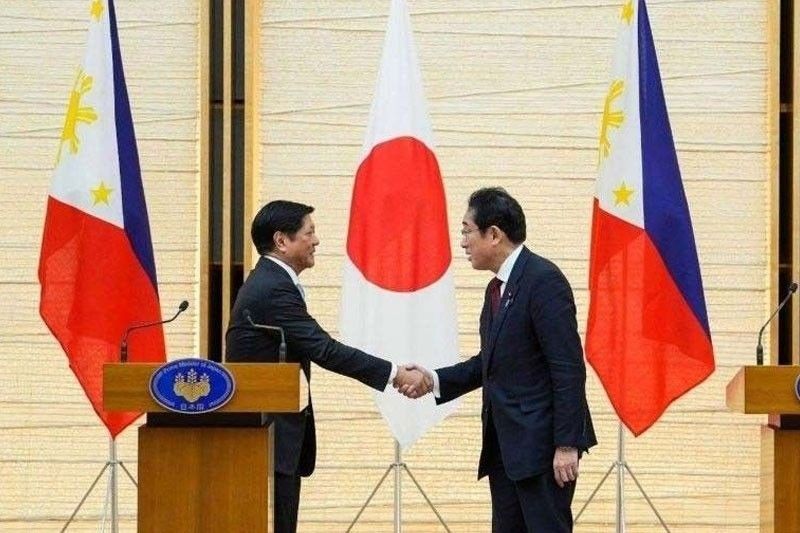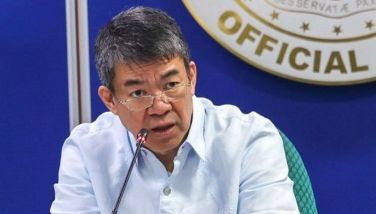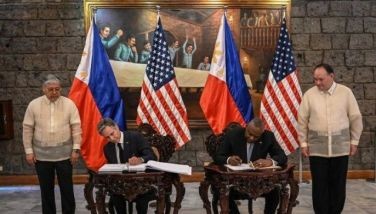Philippines, Japan finalizing defense-access pact

MANILA, Philippines — Japan’s foreign affairs and defense chiefs are scheduled to visit Manila next month for a high-level meeting with their Philippine counterparts, when a key defense pact could be signed, at a time of escalating concerns over China’s actions in the disputed South China Sea.
The Reciprocal Access Agreement (RAA) will allow the Philippines and Japan to send military forces to each other’s territory for various initiatives, including maintaining peace in the South China Sea (SCS) and West Philippine Sea (WPS).
President Marcos earlier described the proposed agreement as an “extremely significant” deal that would be signed within the year.
The Department of Foreign Affairs (DFA) said Japanese Foreign Minister Kamikawa Yoko and Defense Minister Kihara Minoru would undertake an official visit to Manila on July 8.
They are scheduled to meet with Foreign Affairs Secretary Enrique Manalo and Defense Secretary Gilbert Teodoro Jr. for the convening of the 2nd Philippines-Japan Foreign and Defense Ministerial Meeting (“2+2”).
The DFA said the four ministers are expected to discuss bilateral and defense and security issues affecting the region and exchange views on regional and international issues.
During the visit, Manalo and Teodoro will also hold separate bilateral meetings with their counterparts to discuss areas of mutual concern.
Senior Japanese lawmakers, including Japanese House of Representatives member Wada Yoshiaki, are also in the country to look into how Japan and the Philippines can further work together on the WPS problem.
Senior Japanese lawmaker Onodera Itsunori was quoted as saying that they are looking to make significant progress and ratify the RAA during next month’s meeting.
The DFA said the 2+2 Foreign and Defense Ministers Meeting is the highest consultative mechanism between the Philippines and Japan to date.
It is a platform to further strengthen the decade-old Strategic Partnership between both countries with the inaugural 2+2 held in April 2022 in Tokyo, Japan.
The DND, in a separate announcement, said that during the 2+2, the ministers will engage in comprehensive discussions on a range of bilateral, defense and security issues affecting the region.
“These discussions will encompass a detailed exchange of views on broader regional and international matters, aiming to strengthen cooperation and mutual understanding between the two nations,” it said.
Japan has been very supportive of the country’s efforts to counter China’s increasingly aggressive actions against the Philippines in the WPS.
During a visit to Manila last year, Japanese Prime Minister Fumio Kishida agreed with President Marcos to start negotiations on a reciprocal access agreement which would allow troops to enter each other’s territory for joint military exercises and strengthened defense cooperation.
Japanese lawmakers slam China
Japanese lawmakers – including Onodera Itsunori, Liberal Democratic Party and member of the House of Representatives and former Minister of Defense; Wada Yoshiaki, Liberal Democratic Party and member of the House of Representatives and former Senior Advisor to the Minister of Defense, and Matsukawa Rui, Liberal Democratic Party and member of the House of Councilors and former Parliamentary Vice Minister of Defense – all condemned China’s behavior in the WPS.
According to them, the Philippines and Japan both experience harassment from China and in Japan’s case, in the Senkaku Islands in the East China Sea.
The Japanese lawmakers said such abusive actions, particularly the June 17 incident on the latest RORE mission to Ayungin Shoal, are condemnable acts of piracy.
They said Japan can definitely support the Philippines through defense assets, defense training and any other possible assistance the Philippines may need.
“We will do our best to provide to make sure to maintain the peace and stability of the Indo-Pacific,” they said, noting that a strong Philippines-Japan cooperation benefits both countries as well as the region.
Ironclad commitment
The US has once again reminded China of its “ironclad” commitment to the Philippines under the Mutual Defense Treaty (MDT) amid China’s “destabilizing actions” in the SCS and WPS.
US Deputy Secretary of State Kurt Campbell spoke with People’s Republic of China (PRC) Executive Vice Foreign Minister Ma Zhaoxu over the phone on Thursday to discuss the matter and other issues of mutual concern, US State Department spokesman Matthew Miller announced yesterday.
He said the two officials discussed key bilateral, regional and global issues, including areas of cooperation and difference.
“The Deputy Secretary raised serious concerns regarding the PRC’s destabilizing actions in the South China Sea, including at Second Thomas (Ayungin) Shoal, and affirmed the United States’ support for freedom of navigation and overflight and the peaceful resolution of disputes, consistent with international law,” Miller said.
“The Deputy Secretary also reiterated that US commitments to the Philippines under the Mutual Defense Treaty remain ironclad,” he added.
Miller said that Campbell stressed the importance of maintaining peace and stability across the Taiwan Strait while likewise reiterating concern over the PRC’s support for the Russian defense industrial base and discussed challenges on the Korean Peninsula.
Parliamentarians
The International Parliamentary Alliance on China (IPAC) is now calling on governments around the world to condemn Beijing’s disregard for the “judgement of legitimate international bodies” covering the West Philippine Sea.
According to Cagayan de Oro City Rep. Rufus Rodriguez, IPAC had recently issued a statement assailing China’s continuing “aggression and provocation” in the disputed waters.
The statement was signed by lawmakers from some European Union countries and 23 nations, including Rodriguez and Zamboanga del Norte Rep. Adrian Michael Amatong.
“We thank them and appreciate their support for our country, which has been at the receiving end of China’s intrusive and aggressive activities in the West Philippine Sea and inside our own 200-mile exclusive economic zone (EEZ),” Rodriguez added.
IPAC said that Beijing is seeking to impose and enforce the “no trespass” rules around the disputed waters but “these rules have no basis in law.”
“On the contrary, in 2016, when asked about the matter, the Arbitral Tribunal established by the United Nations Convention on the Laws of the Sea – to which both the Philippines and China are a party – ruled that the Shoal was in the Exclusive Economic Zone of the Philippines,” it added
IPAC has reminded Beijing that “no international body recognizes their claim of jurisdiction over Second Thomas Shoal, regardless of the outlandish assertions of the so-called Nine-Dash Line.” — Sheila Crisostomo
- Latest
- Trending




























